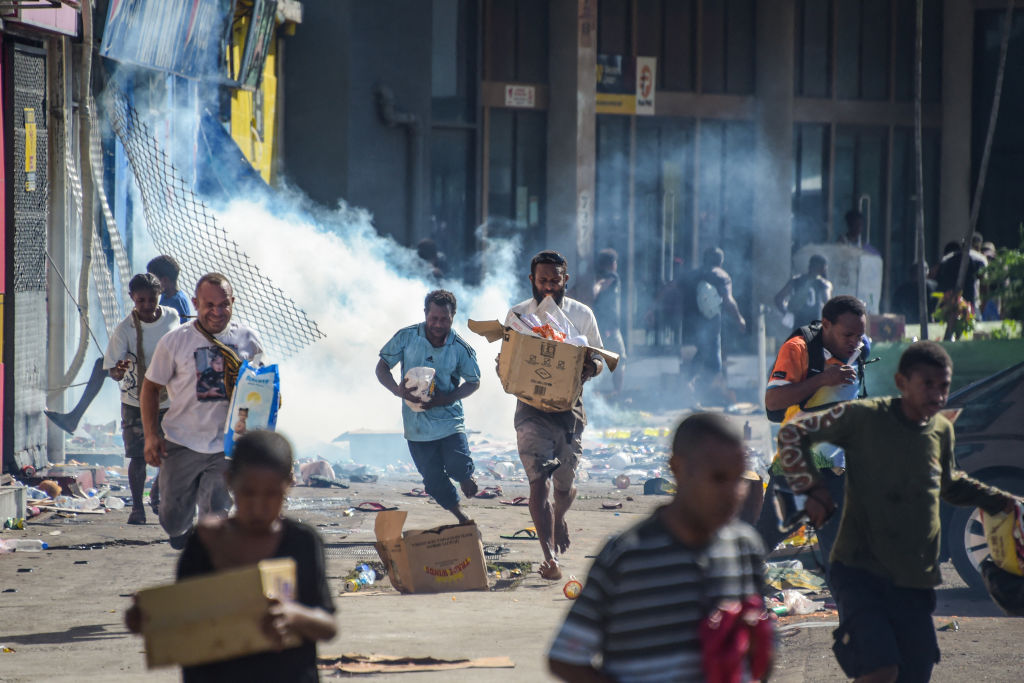Deadly riots erupted across the small Pacific nation of Papua New Guinea, after police and other public servants went on strike over unexplained deductions in their pay.
Local media outlets report that shops have been razed and burned down, businesses looted, and innocent bystanders assaulted in the capital city of Port Moresby, as havoc was wreaked nationwide, on Wednesday. Protesters stormed Manasupe Haus, home to the Prime Minister’s office, setting fire to its guardhouse and other items in front of its gates. The U.S. embassy in Port Moresby also alerted that shots were fired near its compound. More than 100 police personnel are reportedly being deployed to the capital to respond to the uproar.
[time-brightcove not-tgx=”true”]
“We have faced an unprecedented time in our history,” Port Moresby Governor Powes Parkop said in a Facebook livestream Wednesday. “Our priority is to bring safety and security to our people, to our country, to our families.”
The extent of the nationwide damage remains unclear, but the Australian Broadcasting Corporation (ABC) reported that at least 15 people have been killed—eight in Port Moresby, and seven others in the northern city of Lae.
Why did protests break out?
The unrest originated over police officers’ grievances that some U.S.$100—which ABC reports is about half the pay of junior staff—was deducted from their wages in their first pay period of the year. The cut’s alleged links to an increase in taxes sparked outrage among the disgruntled public workers, so in response, they stopped working and took to the streets in the morning.
The country’s Internal Revenue Commission, however, denied that there was such a tax increase. Internal Security Minister Peter Tsamalili also denied this, speaking to the protesting police, pinning their docked pay on a “glitch” in the government’s payroll system, Alesco. Prime Minister James Marape echoed this, Papua New Guinea’s The National reports, saying that the Finance department would fix the anomaly and that the deducted wages would be included in their second pay period.
Local reports suggested bad actors piggybacked on the protests and reports of businesses being looted streamed in by the afternoon. Local newspaper Post Courier reported that supermarkets were ransacked, some patients in some hospitals were evacuated, and, outside its newsroom, shots were heard. Reports of looting extended as far as Lae, 190 miles north of the capital.
Videos shared on social media showed buildings burning in Port Moresby, and some Chinese businesses were also attacked—prompting Beijing to issue “solemn representations” with the government of the Pacific nation, according to AFP.
How has the Papua New Guinea government responded?
Since the riots were led by police personnel and public servants who might normally respond to such unrest, the Papua New Guinea government deployed its military. Soldiers patrolled the streets of the Gerehu commercial area on Thursday morning, warning against causing disturbances. A video on social media shows one soldier even appealing to incensed residents to calm down.
In response to the violence, Marape said that the government will rectify the pay error, but he added that there were other ways to respond to such grievances. “[For] issues that are legitimate, [there are] avenues in which those issues must be raised,” Marape said, according to The National. He added in a press conference Thursday that it was “not right” for anyone to “take to the streets to do anything and everything they feel needs to be done.”
Why does this matter?
The civil unrest comes at a sensitive political time for Papua New Guinea, which finds itself straddling between the interests and inroads of the U.S. and China, each vying for greater influence in the Pacific region. Meanwhile, residents have been cash-strapped due to increasingly high costs of living and high unemployment rates, which opposition leader Joseph Lelang told ABC Radio Australia was an underlying reason for the protests. “That is their constitutional right to go and express their grievances about this matter,” he said.
Marape has previously said his goal is to expand the nation’s economy to 200 billion kina ($55 billion) by 2029. But he may soon face a vote of no confidence in parliament, as the 18-month grace period for such a vote is about to expire in February. A successful no-confidence motion would result in Papua New Guinea choosing a new Prime Minister in a snap parliamentary election.
Read More: The Ultimate Election Year: Half of World Heads to Polls in 2024

